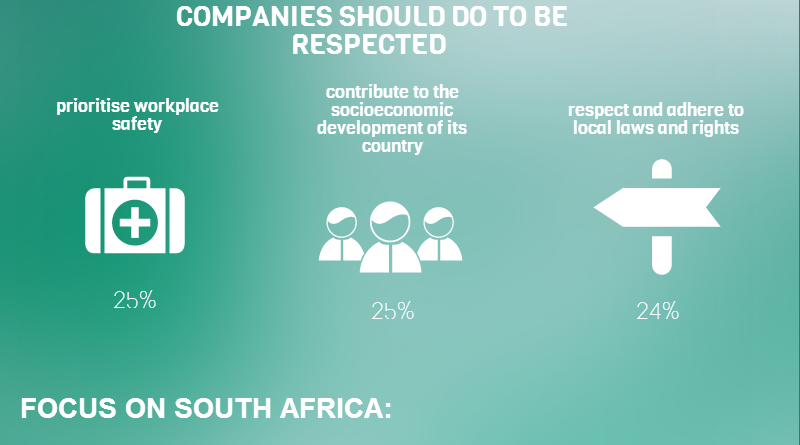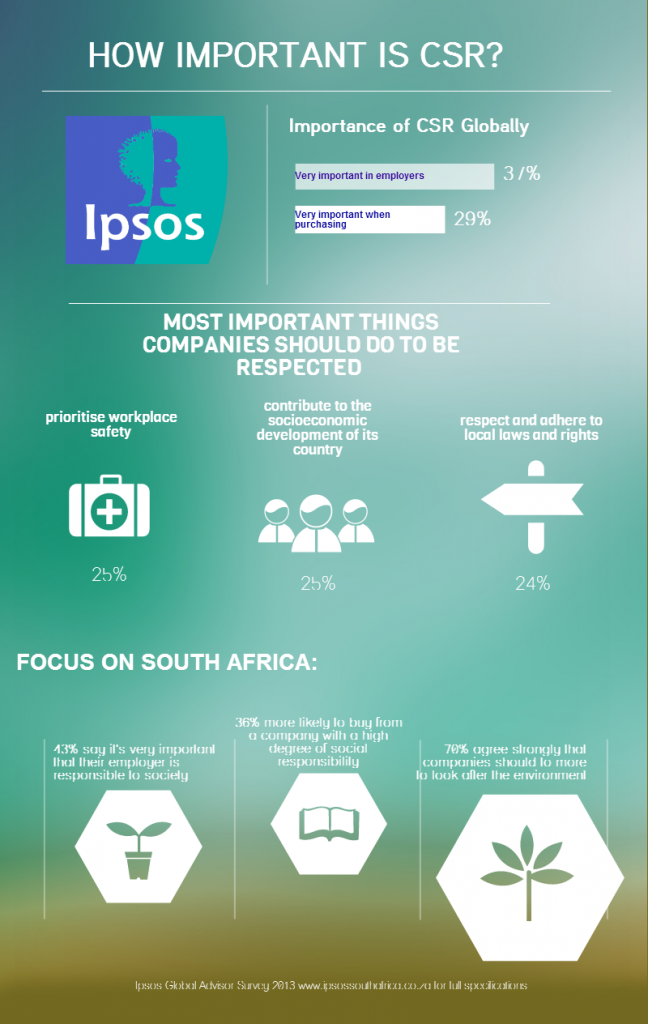How important is Corporate Social Responsibility in South Africa?
Almost four in ten (37%) employees rate corporate social responsibility as ‘very important’ when it comes to their employer; three in ten (29%) say the same regarding purchasing decisions.
Global majority strongly agree that companies should pay more attention to the environment (61%), and contribute more to society (52%)
Bryanston – Almost four in ten (37%) employees in 24 countries indicate it is ‘very important’ for their own employers to be ‘responsible to society and the environment’ The emphasis on its importance rises to 80% when it is combined with those employees who believe it is somewhat important (37% very / 43% somewhat) that their employer is responsible. Three in ten (29%) report ‘a high degree of social responsibility’ is very important when forming a purchase decision while about half (45%) view it as fairly important for a total of 74% who say it is important.
The study, conducted among 18,150 adults by global market research company Ipsos, asked respondents to consider their views of large companies. The poll found that the majority of respondents ‘strongly agree’ that companies should ‘pay more attention to the environment’ (61%) and ‘do more to contribute to society’ (52%).
When asked to consider what the top two most important things a company must do to be respected, the top items among survey respondents were: ‘prioritise workplace safety’ (25% mark it as first priority), ‘contribute to the socioeconomic development of the countries where it operates’ (25%) and ‘respect and adhere to local laws and rights’ (24%).
37% Seek Employers Who Champion CSR
Thinking about the organisation they currently work for, four in ten (37%) of employed respondents in the survey report they find it very important that their ‘own employer is responsible to society and the environment’. Another four in ten (43%) find it fairly important, one in ten (12%) not very important and 3% not at all important. Just a few (5%) indicate they have no opinion on the matter.
On a country by country basis, Brazil (65%), Mexico (59%), Argentina (57%), Indonesia (55%) and India (51%) top the charts for proportions of employed respondents indicating it is very important their employer is responsible to society and the environment while Japan (11%), France (17%), China (19%) and South Korea (22%) have the lowest proportions of advocacy among employees. It is interesting that developing countries form the first group, while those at the bottom of the scale are made up of more industrialised nations (with the possible exception of the fast-growing China).
Just over four of ten (43%) South Africans find it very important that their employer is responsible to society and to the environment. This is most noticeable amongst the 35 – 49 year old age group.
Three in Ten Prioritise CSR When Making Purchases
When forming a decision about buying a product or service from a particular company or organisation, it is very important for three in ten (29%) global respondents that it shows ‘a high degree of social responsibility‘. This factor is fairly important for about half (45%) of global respondents, not very important for 17%, not at all important for 4% and evokes no opinion in 5%. Those in Indonesia (57%), Brazil (56%), Mexico (50%) and India (45%) are most likely to consider CSR important for their purchasing decisions while those in France (11%), Japan (13%), Belgium (15%) and Germany (15%) are least likely.
From a consumer point of view, 36% of South Africans are more likely to purchase a service or product from a company who has a high degree of social responsibility. This sentiment is more pronounced amongst women – 42% of whom are more likely to go for a product from a company with a high degree of social responsibility compared to 29% of males.
Majority Agree: Companies should do more…
A majority strongly agree that ‘companies should do more to contribute to society‘(52%) while three in ten (32%) tend to agree, and one in ten (12%) neither agree nor disagree. Only 2% tend to disagree while 1% strongly disagree and another 1% say they don’t know or have no opinion. Similarly, a majority of those in 24 countries indicate they strongly agree ‘companies should pay more attention to the environment‘ (61%). Three in ten (28%) indicate they tend to agree, one in ten (8%) neither agree nor disagree, and hardly any (1%) say each of: tend to disagree, strongly disagree and don’t know/no opinion.
The top countries strongly agreeing that companies should contribute more to society are Turkey (85%), Brazil (78%), Saudi Arabia (78%) and Mexico (76%), while the bottom four are Japan (22%), United States (33%), Great Britain (34%) and Australia (34%). The top countries strongly agreeing companies should pay more attention to the environment are Mexico (90%), Turkey (89%), Brazil (88%) and Argentina (84%) while those at the bottom of the list are again Japan (28%), Great Britain (36%), United States (40%) and Australia (41%).
Workplace Safety, Socioeconomic Contributions are Top Issues
Participants were asked to choose the two most important things that a company must do to be respected. One quarter selected ‘prioritise workplace safety’ (25%), ‘contribute to the socioeconomic development of the countries where it operates’ (25%) and ‘respect and adhere to local laws and rights’ (24%) as ‘first’ in terms of priority. Following these top items are: ‘maintain sustainable environmental practices’ (14%), ‘leave behind conditions for sustainable development after operations are closed’ (6%) and ‘fulfill financial and commercial targets to increase shareholder value’ (6%).
In South Africa, the highest ranking attribute in terms of gaining respect is that a company should respect and adhere to local laws and rights (26%). Following that, South Africans believe that companies can gain respect by:
- maintaining sustainable environmental practices (18%)
- prioritising workplace safety (18%) and
- contributing to the socioeconomic development of countries where it operates (18%)
Technical aspects
These are some of the findings of an Ipsos Global @dvisor poll conducted between April 2nd and April 16th , 2013. The survey instrument is conducted monthly in 23 countries via the Ipsos Online Panel system. The countries reporting herein are Argentina, Australia, Belgium, Brazil, Canada, China, France, Germany, Great Britain, Hungary, India, Indonesia, Italy, Japan, Mexico, Poland, Russia, South Africa, South Korea, Spain, Sweden, Turkey and the United States of America. An international sample of 18 150 adults (of those, 12,266 are employees) aged 18-64 in the US and Canada, and age 16-64 in all other countries, were interviewed. Approximately 1000+ individuals participated on a country by country basis with the exception of Argentina, Indonesia, Mexico, Poland, South Africa, South Korea, Sweden, Russia and Turkey, where each have a sample 500+. Weighting was then employed to balance demographics and ensure that the sample’s composition reflects that of the adult population according to the most recent country Census data and to provide results intended to approximate the sample universe. The precision of Ipsos online polls are calculated using a credibility interval. In this case, a poll of 1,000 is accurate to +/- 3.5 percentage points and one of 500 is accurate to +/- 5.0 percentage points in their respective general populations. All sample surveys and polls may be subject to other sources of error, including, but not limited to coverage error, and measurement error. For more information on credibility intervals, please visit the Ipsos website at http://ipsos-na.com/dl/pdf/research/public-affairs/IpsosPA_CredibilityIntervals.pdf
Due to the sample definition and the low incidence rate of access to computers in SA these results tend to reflect the opinions of a more affluent group in society.
About Ipsos
Ipsos is the second largest global survey-based market research company, owned and managed by research professionals that assess market potential and interpret market trends for over 5,000 worldwide clients to develop and test emergent or existing products or services, build brands, test advertising and study audience responses to various media, and, measure public opinion on issues and reputation. With 16 500 employees working in wholly owned operations in 84 countries, Ipsos conducts advertising, customer loyalty, marketing, media, and public affairs research, as well as forecasting, modeling, and consulting and a full line of custom, syndicated, omnibus, panel, and online research products and services in over 100 countries. Founded in 1975 by Jean-Marc Lech and Didier Truchot, Ipsos has been publicly traded since 1999. In 2008, Ipsos’ revenues totaled €979.3 million. Listed on Eurolist by NYSE – Euronext Paris, Ipsos is part of the SBF 120 and the Mid-100 Index and is eligible to the Deferred Settlement System. Visit www.ipsos.com to learn more about Ipsos offerings and capabilities.





